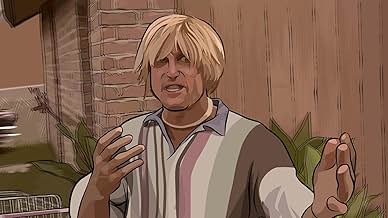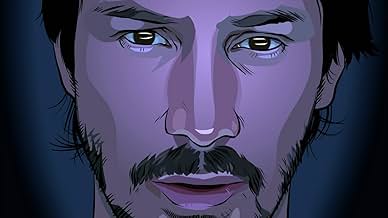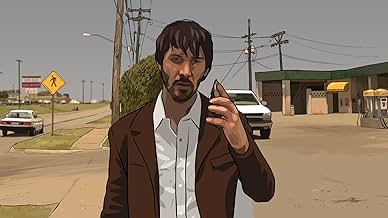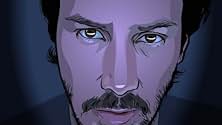Un flic sous couverture dans un futur pas si lointain est impliqué dans une histoire de nouvelle drogue dangereuse et commence alors à perdre sa propre identité.Un flic sous couverture dans un futur pas si lointain est impliqué dans une histoire de nouvelle drogue dangereuse et commence alors à perdre sa propre identité.Un flic sous couverture dans un futur pas si lointain est impliqué dans une histoire de nouvelle drogue dangereuse et commence alors à perdre sa propre identité.
- Director
- Writers
- Stars
- Prix
- 4 victoires et 21 nominations au total
- Waitress
- (as Natasha Valdez)
Avis en vedette
For those who haven't read the book, it's important to know what you're getting into. PK Dick wrote this novel as a way of telling the story of how he and his friends in the early '70s damaged and destroyed themselves with drugs. He tells this story within the framework of a surreal science fiction thriller, but many of the scenes are straight from his own experiences with the unpleasant consequences of people using drugs and disintegrating mentally.
This film does an amazing job of capturing the feel and tone of the book as well as the paranoia, perceptual distortions, and chaos of hallucinogenic overindulgence. Add to that a story that only gradually emerges from the madness, but by the end brings in a lot of heavy ideas such as the existence of free will, whether ends justify means, etc. There is a sense of consequence to what happens in the film, a sense of despair at what has been lost. So this story of drug-addled losers becomes the story of the human struggle for identity and meaning.
I have a couple of minor quibbles regarding scenes from the book that only partially made the cut (no explanation for the significance of "If I'd known it was harmless I would have killed it myself, no little kid to explain how 6 and 3 gears means 18 speeds). Still, most adaptations of PK Dick stories take a few basic ideas and try to shape them into more conventional films that fit into established genres. Even when it works, such as with Blade Runner or Total Recall, it's not really PK Dick. Not so this film. This is PK in all his dark and perverse and deeply thoughtful glory.
In this prescient tale set in the "near future," Keanu Reeves plays the undercover cop, Agent Fred, who, under the pseudonym Bob Arctor, is sent to live in a home with several known drug addicts: Barris, played by Robert Downey Jr. and Luckman, played by Woody Harrelson. When Fred begins taking the newly fabricated drug known as "Substance D," which causes the two hemispheres of the brain to disconnect and go to war with one another, Fred/Arctor becomes essentially two distinctly separate persons, so that, in his capacity as an undercover agent, he is actually spying on himself without realizing it. Winona Ryder appears as Donna, the beautiful but sexually frigid coke addict who becomes Arctor's girlfriend.
"A Scanner Darkly" is an easy film for a viewer to get lost in, so it pays to know a little something about the story before heading into it. As a screenwriter, Linklater captures the woozy insubstantiality of the drug experience well enough but often at the expense of narrative consistency and coherence, especially for the uninitiated. I'm afraid lots of people may become frustrated and confused near the beginning and simply tune out. That would be a real shame because the movie turns into a darkly fascinating rumination on the effect drug use has on the mind, while at the same time raising the ethical issue of just how far the government should go in "sacrificing" innocent victims to achieve a desired, perhaps even laudable, end. At times the movie may seem to be playing both sides of the drug-war fence, yet the sophistication and complexity of Dick's vision keeps it from becoming either an anti-government screed or an anti-drug diatribe.
Some of the dialogue comes off as corny and over earnest, but much of it is incisive and darkly humorous, with Barris and Larkman, in particular, hitting delicious comic heights in their paranoid/delusional ravings and interchanges.
Enter "A Scanner Darkly", aside from the Interpolative Rotoscoping that the film maker used to put the graphical images of this movie together and give it an amazing visual feel all its own, the vision and imagery conveyed by the film are as true to Dick's original as any movie has come. I left the theater feeling overwhelmed, touched, and changed, much the same way as when I'd finished the book. This is rare, and it is decidedly a beautiful thing.
Le saviez-vous
- AnecdotesRobert Downey, Jr. wrote most of his lines down on post-it notes and scattered them around the set so he could read off them while filming a scene. The rotoscoping team simply animated over the notes to remove them from the film during post-production.
- GaffesWhile showing the monitoring equipment, Hank tells Fred that he could be anyone from Arctor's circle of friends, including Barris. This made sense in the book, however, by this time in the movie Hank has already seen Fred alongside Barris, so he could not possibly think they are the same person.
- Citations
Fred: [voiceover] What does a scanner see? Into the head? Down into the heart? Does it see into me? Into us? Clearly or darkly? I hope it sees clearly because I can't any longer see into myself. I see only murk. I hope for everyone's sake the scanners do better, because if the scanner sees only darkly the way I do, then I'm cursed and cursed again.
- Générique farfeluThe "Phil" mentioned in the "in memoriam" list as having permanent pancreatic damage is Philip K. Dick himself.
- Bandes originalesFog
Written by Thom Yorke (as Thomas Yorke), Phil Selway (as Philip Selway), Jonny Greenwood (as Jonathan Greenwood),
Colin Greenwood and Ed O'Brien (as Edward O'Brien)
Performed by Radiohead
Courtesy of Capitol Records
Under licence from EMI Film & Television Music
Meilleurs choix
Détails
- Date de sortie
- Pays d’origine
- Site officiel
- Langue
- Aussi connu sous le nom de
- Una mirada a la oscuridad
- Lieux de tournage
- sociétés de production
- Consultez plus de crédits d'entreprise sur IMDbPro
Box-office
- Budget
- 8 700 000 $ US (estimation)
- Brut – États-Unis et Canada
- 5 501 616 $ US
- Fin de semaine d'ouverture – États-Unis et Canada
- 391 672 $ US
- 9 juill. 2006
- Brut – à l'échelle mondiale
- 7 660 857 $ US
- Durée
- 1h 40m(100 min)
- Couleur
- Mixage
- Rapport de forme
- 1.85 : 1































